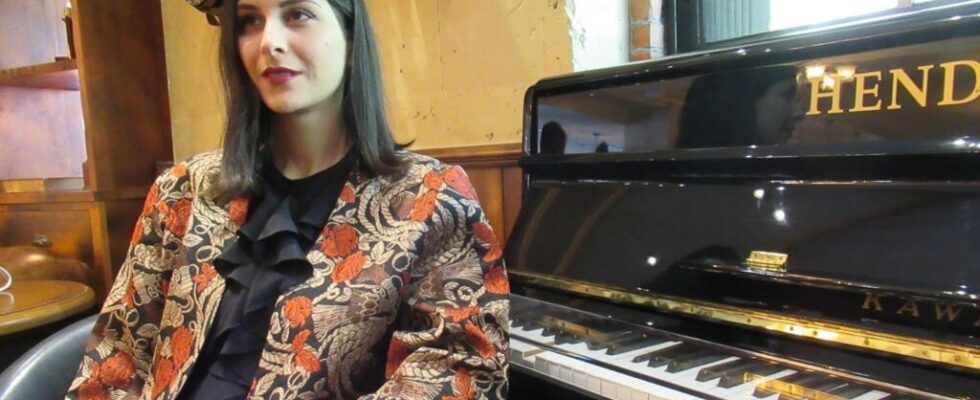Mezzo-soprano Anousha Nazari has lived in Paris for eight years. Imbued with poetry, this 34-year-old classical singer from northern Iran would like to see women perform solo roles in her country. She is not an activist, nor a political activist, but she supports her compatriots, and above all, she wants to believe in the power of music.
5 mins
The first thing you notice when you meet Anousha Nazari is that she often has laughter on the edge of her lips. This ability to have fun with everything contrasts with his warm voice and a light presence, which will take its place little by little. It is in a café in the very chic 8th arrondissement of Paris that the Iranian mezzo-soprano living in France retraces her journey. “ When I was a teenager, I always wanted to go and see the world. I had that in me. I first thought about going to Austria because that’s where classical music comes from. But I was always very fascinated by French culture », she will say.
Born in Sari, a town located on the Caspian Sea – in the north ofIran –, young Anousha discovered classical music thanks to her father’s cassettes. This father, a lawyer, frequented the opera and concerts before the Islamic revolution. His mother, a financial director, is also interested inart. The teenager does not imagine becoming a classical singer. She started singing around 18-19 years old, when she entered university. In parallel with her architectural studies, she studied music in private academies and took private lessons; she opted for a career as a singer.
As a woman, Anousha can be a backing vocalist, but not a soloist. She finally joined the Tehran symphony orchestra, the most prestigious in the country, in a mixed choir, which requires, as in the whole country, the wearing of the veil.
Poetry in everyday life
It was in 2016 that Anousha Nazari left for France on a student visa, in order to perfect her vocal technique and to be a soloist. She entered the regional conservatory of Cergy-Pontoise, in the Paris suburbs. Looking back in her thirties, she believes that it is “ very difficult » to start all over again later. What surprises the person who has the books of Balzac, Romain Rolland or the spirit of the Enlightenment in mind? And concedes an idealized vision of France? “ Poetry is very important in Iran. Even someone who is illiterate will recite poems to you. When I came here, I thought poetry was something very popular. But I realized that it belongs to an elite », she notes.
With her husband, an Iranian architect met in France, Anousha Nazari co-founded the cultural association Gondishapur, whose name is that of an ancient Persian academy where different disciplines (medicine, philosophy, theology, etc.) crossed paths. For his second album, In Vino Veritasthe singer mixes imagined pieces “ custom made » by contemporary Iranian composers to verses by Khayyam, an 11th century poet. In a trio with a pianist and a clarinetist, she makes her voice resonate with the words of this scholar who has written extensively on wine. “ These poems are really close to my heart. I think an artist should do something that is present in their life. Art is not decorative, it really comes from a personal need “, she says.
Anousha Nazari’s music links Iran and the West. But it is closer to Western chamber music than to the Iranian tradition. She, who was structured intellectually thanks to her training as an architect, has already paid tribute to the priest in the past Komitaswho collected traditional Armenian songs at the beginning of the last century.
About her daily life as a classical singer, she says: “ We are like an athlete, we have to warm up and do daily exercises. I also practice yoga and meditation to maintain harmony between body and mind. “. This job, ” very difficult “, requires an impeccable lifestyle, ” while a rock or jazz singer can drink, smoke, or live dangerously “.
Not an activist, but a supporter of Iranian women
The one who doesn’t say to herself ” not an activist, nor a political activist », hesitates to answer the questions asked about the condition of Iranian women. Supporting this cause, she nevertheless intends to fight so that classical singers can access solo roles. Last year, to mark the first anniversary of the “Woman, Life, Liberty” movement, she set up the “Wickes of Fire” project with his association. It was then five videos in which she sings and where the actress Julie Gayet reads poems resulting from the protests following the death of young Masha Amini.
What is the classical singer’s view on the protest movement which set Iran ablaze and caused a wave of emotion throughout the world at the end of 2022? “ It was an anger that had been inside us for decades. We are obliged to speak, to say. I think that silence is tacit complicity with the people who do these things “.
A few days later the death sentence in Iran of the famous rapper Toomaj Salehi, supporting this protest, she presented her second album at the Salle Cortot in Paris. In the public, we heard Persian everywhere, part of the Iranian diaspora living in the French capital was on the balcony. This May evening, the evening was dedicated to Toomaj Salehi and then, Anousha Nazari’s trio entered the stage. At that point, politics gave way to music.
Read also“Woman, life, freedom”: “Iranian civil society marks a notable victory against the regime”
